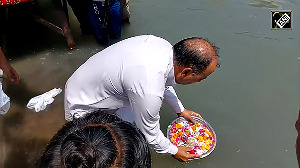The first time Eric Smith laid eyes on Tom Szaky, in April 2005, he felt a shiver of panic. Oh, my God, Smith thought. What have I gotten myself into?
There they were, about to meet with Home Depot's global product merchant, John Fuller, a guy who could make or break a young company with a simple yes or no, and Szaky, the founder and CEO of TerraCycle, all of 23 years old at the time, shows up looking as if he's just rolled out of bed after a night of heavy partying--rumpled, unshaven, and dressed in jeans, a sports jacket, a shirt with no collar, and a John Deere baseball cap.
This was not what Smith had bargained on. The director of sales for Philips Lighting, he had set up the meeting as a favor to his former boss and mentor at SC Johnson. Granted, on the telephone Szaky had sounded young, but never did Smith imagine that he'd be walking into the meeting with Ferris Bueller on his day off.
"Look," Smith said. "Don't say a word. Let me handle it. I know how Home Depot works. I just need a little more information. Where's the presentation?"
"I didn't print out a copy," Szaky said.
"Tom, you always have to have a copy of the presentation to leave with the buyer, especially John Fuller," said Smith. They spent the next hour at Kinko's.
Smith had reason to be concerned. You did not waste John Fuller's time. It was one thing to go to him with Raid insecticides, as Smith had done when he was at SC Johnson, and quite another to bring him the new, unknown plant fertilizer that Szaky was peddling.
Not just any plant fertilizer, either: one made from worm waste. By a company that had been in business barely three years. Run by people who had very little experience supplying a mass merchandiser like Home Depot. Yes, the product was already available on HomeDepot.com, and Home Depot Canada had ordered some, too, but Smith did not expect those deals to carry much weight with Fuller.
Smith's initial impulse was to make the pitch--and then leave as quickly as possible. But as he talked to Szaky, something happened.
"We call it the MOC, or moment of clarity," he says. "That's when you go from seeing a product and a business and a 23-year-old kid and you begin to realize that what he's talking about is much bigger. That's what allowed me to go from being scared to thinking, This could be very interesting."
And indeed it was. "John Fuller started asking his tough questions," says Smith, "and Tom never stopped for a moment, never stuttered during an answer. He had put together a multimedia presentation, and he delivered the whole thing off his computer. It was very, very effective."
The meeting lasted an hour, which was about 45 minutes longer than Smith had expected. Somewhere in the middle of it, an odd notion popped into his head. "I thought, You know, it wouldn't surprise me if I wound up working for this kid someday." Less than four months later, Smith left Philips and took a position as TerraCycle's new vice president of sales.
If you've browsed in the garden section of your local Home Depot or Wal-Mart recently, you may have seen a new plant food somewhere north of the begonias and south of the perlite. It comes in a yellow and green shrink-wrapped bottle with a familiar shape and the kind of spray top you might find on, say, Windex. It may well be the world's first commercial product made entirely from garbage.
The plant food itself is a so-called vermicompost tea, a brew made from the castings (that is, the poop) of red worms that have feasted on various types of organic waste. The containers are reused soda bottles. The spray tops are the unwanted extras that have been dumped by manufacturers of other spray-on products. Even the boxes that the plant food is shipped in are garbage: They're the misprinted rejects of major companies.
But the most striking fact about TerraCycle is the age of its co-founder and CEO, Tom Szaky (pronounced zack-y). He is now 24. A Hungarian by birth and a Canadian by upbringing, he was 19 years old and in his freshman year at Princeton University when he launched the company with one of his classmates, Jon Beyer.
At the time, they were simply trying to win a business plan competition. They came in fourth--out of the money--but they couldn't shake the idea that you could build a business selling garbage.
And now, five years later, they have done just that. In 2005, TerraCycle had $461,000 in sales, mostly in Canada, where the product was carried by Home Depot and Wal-Mart as well as other chains. With the decision by both retailers to roll it out in their U.S. stores this year, the company's 2006 sales are expected to top $2.5 million.
It is unusual, to say the least, for mass merchandisers to take a chance on a young, unproven company, especially one with a 24-year-old CEO.
"Tom is a unique individual," says Wes Neece, who took over as Home Depot's buyer of gardening supplies when Fuller left for a job at another company. At Fuller's suggestion, Neece met again with Szaky and decided to move forward with TerraCycle. "I have a lot of faith in him. He has surrounded himself with very strong talent to get his ideas to fruition."
Indeed, except for Szaky and Beyer, who is TerraCycle's chief technology officer, every one of the 12 people in key positions is a seasoned business veteran with more than a decade of experience in his or her line of work. Most of them, moreover, appear to enjoy having a boss who is barely half their age.
"Tom, I believe, is one of the best managers that I've ever worked for," says Eric Smith. "He's highly motivational. He works as hard as I've ever seen anybody work, and he totally empowers you to do what you feel needs to be done. And he is great in front of a customer because he knows his product so well."
It also helps that Szaky has a product on which retailers can earn gross margins two or three times those they get on competitive products.
TerraCycle can offer retailers such margins because its own margins are so high. Worms, after all, do not charge for their labor, never take a day off, produce their body weight in waste every 24 hours, and--since they copulate while they eat--double their numbers every three months. They are also content to dine on stuff that might otherwise go into landfills.
Szaky likes to point out that, in theory, TerraCycle could get paid to haul away the garbage the worms eat, thereby raising the possibility of having a negative cost of materials. That hasn't happened yet--right now TerraCycle is buying the worm poop from which it brews its tea--but the observation highlights the lovely economics of selling garbage, assuming you can come up with a product that people want to buy.
And the indications are that TerraCycle does have such a product. Its flagship plant food was the top seller in its category after it debuted on HomeDepot.com in 2004, and last year it ran strong against Scotts Miracle-Gro, the behemoth of plant food, both in Canada and in New Jersey, where Home Depot put it in stores throughout the state.
Although Miracle-Gro does have a line of organic garden soils, it is best known for its plant food, which is formulated from a variety of nutrients to create a product rich in nitrogen, phosphate, and potassium. It is undeniably effective, but it isn't organic.
Moreover, in a series of independent tests conducted at the Rutgers Eco-Complex in Bordentown, New Jersey, TerraCycle was found to perform as well as or better than Miracle-Gro. And, whereas Miracle-Gro can cause plant burn when applied improperly, TerraCycle claims that its products never do: The more you use, the healthier the plants become.
It all adds up to a strong sales pitch: "If you go to a supermarket and buy an organic banana instead of a conventional banana, you're going to pay twice as much for it," notes Szaky. "We have an organic product that's both better and cheaper than the conventional product. What are people going to buy?"
Of course, they'll buy it only if they know about it, but Szaky has that base covered. He has been extraordinarily adept at generating PR, landing articles in The New York Times and, yes, Inc.com even before he had a product to sell.
Since then, pieces about TerraCycle have appeared in dozens of newspapers, on several U.S. and Canadian television networks, and in magazines ranging from Time to BusinessWeek to Real Simple. Along the way, Szaky has managed to imbue the entire operation with the aura of an environmental crusade.
Through TerraCycle's Bottle Brigade, for example, he has enlisted elementary schoolchildren (among others) in a campaign to collect used soda bottles for the company, which then contributes five cents per bottle to the school--twice as much as TerraCycle pays recyclers.
Thus solid waste is recycled; worthy organizations receive money; environmental consciousness is raised; and the company gets the bottles it needs while sending a potent marketing message, namely, that TerraCycle is not just good for your plants--it's also good for your planet.
The happy confluence of social purpose and financial opportunity has proved to be an extremely effective recruiting tool. All the TerraCycle managers say that they came as much because of the environmental mission as for the financial rewards awaiting them if the company does well. They certainly didn't come for the salary and perks.
Until recently no one in the company made more than $30,000 a year. Some people took pay cuts of as much as 85 percent to join TerraCycle. They'll come out ahead only if their stock options turn out to be valuable.
At the moment, TerraCycle seems to have everything going for it. And yet, looking at it today, you would never guess how often the company has come close to failing. On each occasion, however, an angel appeared in time to rescue Szaky and his project. In the end, TerraCycle proved to be the company that refused to die--and a case study in the power of a big idea.
Tom Szaky is giving a tour of the house he bought in 2004 to accommodate the college interns he brings in each summer to work at TerraCycle. The house is large--10 bedrooms, four stories--and has various touches hinting at faded elegance, including a stained glass window in front, but the bars on the windows testify to its location in a crime-ridden neighborhood of Trenton, New Jersey. "There was a $10 million heroin bust a few blocks from here three months ago," he says. "Last week there was a murder two blocks from here. I heard the gunshot."
Inside, the house has the ambience of a college dorm. Szaky is particularly proud of the furniture. "No entrepreneur should ever buy furniture or mediocre computer equipment," he says.
"Everything here is garbage. Princeton renovates one dorm a year, so we get all that." He points to a large fan and a 52-inch TV set. "That's all student waste. You find it in Dumpsters on move-out day. We get our computers from big companies, which throw them out once a year."
He is not so proud of the plants in the house, most of which appear to be dead. "We have no time to take care of them," he says. "So now we've invented a product that allows plants to go for days without water." On the walls are large swaths of canvas filled with colorful paint swirls. Szaky says he keeps paints and canvases handy to encourage creativity among the interns.
What Szaky does best, in fact, is to get people, especially kids, working together on creative projects. When he was in the third grade, fresh off the plane from Amsterdam, where his family had fled from Hungary, he enlisted his Toronto classmates to help him set a record by folding 5,000 origami cranes.
In the sixth grade, he got students involved in videotaping stories they'd made up. In the eighth grade, he returned to the school and worked with the graduating sixth-graders on putting together the city's first CD-ROM yearbook. In the 10th grade, he came back again, this time bringing along his high school friends, to teach rocketry and set up a rocketry club.
It was another high school project that led to the creation of TerraCycle. The project involved certain plants that Szaky and his friends had tried to grow in hopes of being able to harvest the buds, but instead they kept getting seeds. They still hadn't solved the problem when they all went off to college, Szaky to Princeton and his friends to McGill University in Montreal, taking the plant setup with them.
There one of the friends learned about fertilizing the plants with worm poop. He proceeded to create a little compost heap in a box in his kitchen, bought a squirm of red worms to put in it, and started feeding them table scraps. By the time Szaky came to visit during the fall of his freshman year, the plants had produced a bumper crop of buds.
As it happened, Szaky had been searching for a business to enter in Princeton's annual business plan competition to be held in early 2002.
The answer came to him as he and his friends were enjoying the fruits of their labor. Worms! If these worms could turn table scraps into such terrific fertilizer, just think what you could do with an army of worms! You could recycle all the organic waste in North America! You could solve the problem of dwindling landfill space! You could replace chemical fertilizers with organic fertilizers! And you could make a fortune!
The idea sounded great at the time, and when Szaky returned to Princeton and discovered that his friend Jon Beyer actually knew something about worms--thanks to his father, an ecotoxicologist who had studied them--it was a foregone conclusion that their business plan would center on worm waste. Although they failed to win any prize money in the competition, they kept working on the project.
To do the kind of recycling they had in mind, you needed machinery that could handle tons of waste at a time. Beyer knew of an inventor in Gainesville, Florida, Harry Windle, who had developed something he called a worm gin, which used stacks of conveyor belts to deliver waste to the worms. Szaky and Beyer contacted Windle, who agreed to build them a prototype they could use to test their concept.
The cost would be about $20,000. Beyer contributed $1,000, while Szaky put in $4,000 of his own savings, maxed out two credit cards to raise another $6,000, borrowed $5,000 of bar mitzvah money from a friend in Toronto, and then told his parents that he'd lose it all if they didn't pony up the $4,000 balance--which they did, reluctantly.
While Windle went to work on the worm gin, Szaky began lobbying the university to get garbage from the dining halls and an outdoor space in which he and Beyer could conduct their recycling experiment. For better or worse, he got both.
On the surface, the worm gin was a flop. True, Szaky and Beyer showed they could use it to turn waste into worm poop faster than you could do it with traditional composting, but they didn't prove that such an operation could be commercially viable. What's more, the process was, well, revolting. By the time they got the garbage from the dining halls, it had been sitting for days in the heat of the summer sun and was crawling with maggots and other creepy things.
A young woman Szaky had enlisted to help took one look at the contents of a garbage can and vomited, then quit. Szaky and Beyer wound up doing all of the work themselves. By the end of July, they'd learned a lot about the dos and don'ts of recycling organic waste--and were ready to give up.
For several weeks, they'd put every waking moment into the worm gin and spent every spare nickel on worms. Meanwhile, they were sleeping on the floor of a friend's dorm room and eating what they could scrounge at the dining halls.
They figured they'd sell the worm gin on eBay, pay off their debts, and return to their studies. At least they'd succeeded in generating some publicity for the idea of using worms to recycle organic waste. Now a local AM talk radio station wanted to have Szaky and Beyer in for a live interview.
They thought it would be a cool way to wrap things up. In early August, they went on WCTC-AM and told their story. When they got back to Princeton, there was a message waiting. A local entrepreneur, Suman Sinha, had heard the interview and wanted to meet them. Szaky and Beyer showed him the worm gin and told him how they hoped to expand the operation. Over dinner, he asked them how much money they needed.
"How much can you give us?" Szaky asked.
"Two thousand dollars," Sinha said, and proceeded to write a check. Szaky and Beyer expressed their gratitude and promised him 1 percent of the stock in return.
"Fine," he said. "I'm with you all the way." And, with that, TerraCycle got a new lease on life.
Like Eric Smith, Tom Pyle remembers well his first meeting with Tom Szaky, in the fall of 2002. It was a job interview, and Pyle was the interviewee. He had seen an advertisement in the careers section of TigerNet, the online community for Princeton alumni, placed by students seeking a CEO for their environmentally friendly start-up.
Pyle, who'd spent the previous 20 years doing large-scale project finance, found their story intriguing. He also had a soft spot for idealistic young Princetonians, having been one himself a quarter century before.
So he decided to apply for the job and soon thereafter found himself sitting in a grungy, windowless office in the basement of 20 Nassau Street in Princeton, dressed in his best banker's attire and being interviewed by a kid in a T-shirt and a baseball cap.
"We had a pleasant chat," Pyle recalls. "I was very impressed with him and his vision and his dynamism and his charisma. But I didn't get the job." It went to another Princeton alum, who--like Pyle--was also a Harvard M.B.A. but who--unlike Pyle--drove a Toyota Prius and had experience with start-ups. Pyle wished them luck and went his own way.
He might never have given TerraCycle another thought had he not received a panicky phone call from Szaky about six months later. The new CEO had called Szaky into New York City for a meeting the week before. There, Szaky had been told that in order to free up enough equity to offer the stock options it would take to hire better managers, he and vice president Robin Tator would have to surrender 90 percent of their stock.
Pyle was furious. He sensed an attempt to hijack the company. "So there I was, back in the gravelly little hole underneath 20 Nassau Street," he says. "I said, 'Tom, what we need to do is get you stabilized. You need a board of directors. You need to get a few tribal elders around here to give you some ballast."
Pyle took over as CEO, giving Szaky the title of chairman--they would switch titles later that year--and he began recruiting board members. One was a former Princeton athletic director. Another was an emeritus professor of engineering.







 © 2025
© 2025